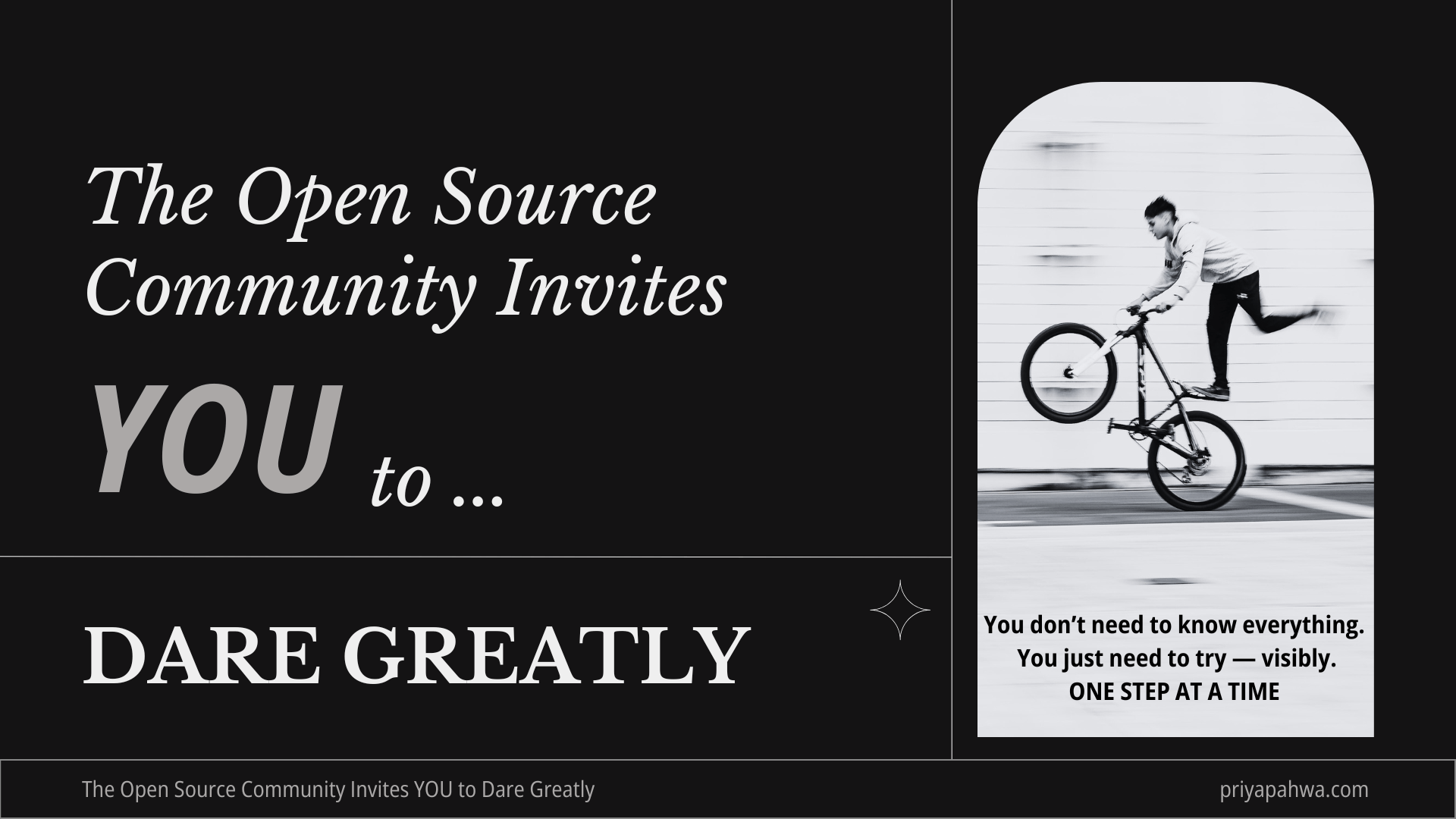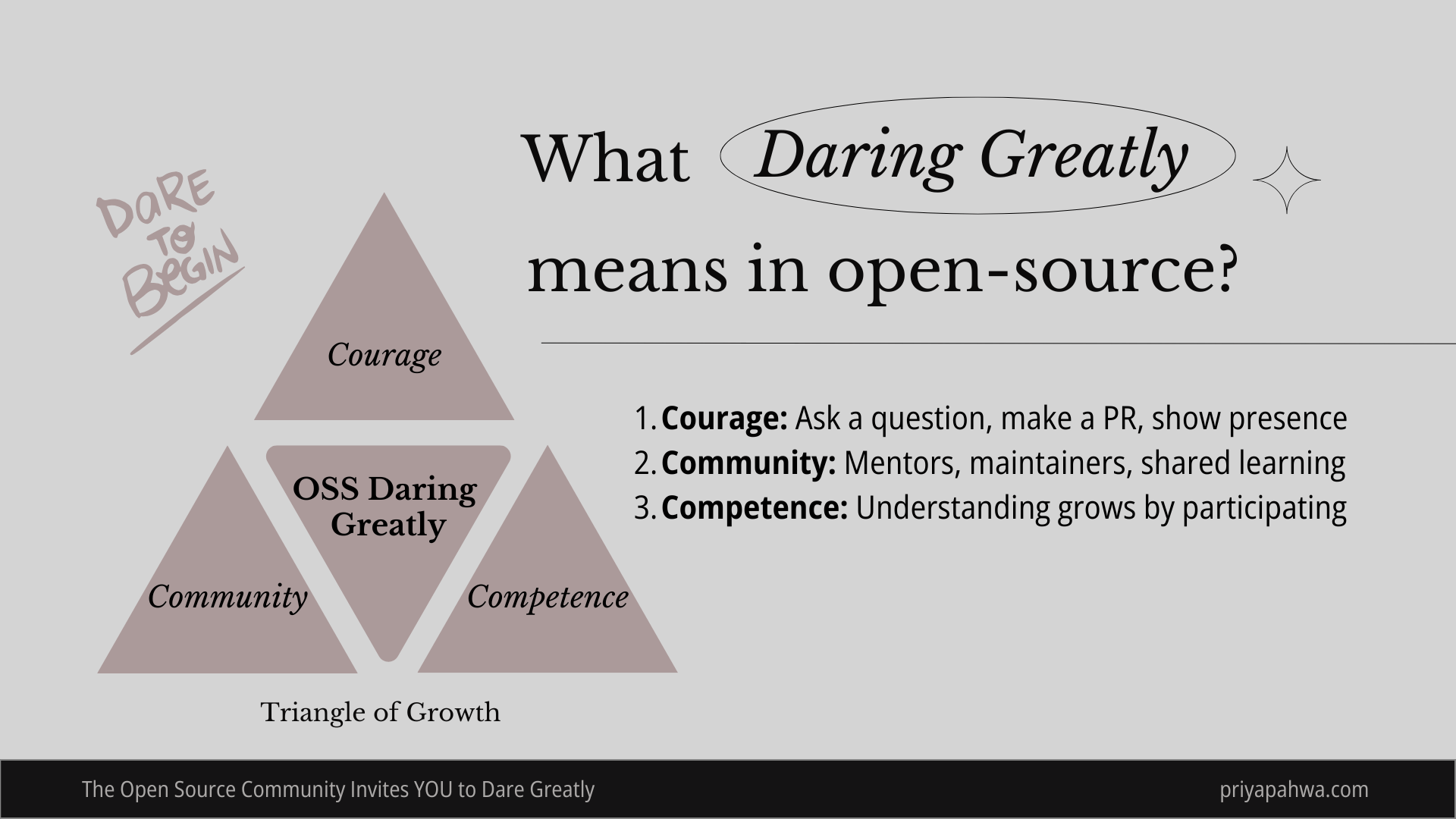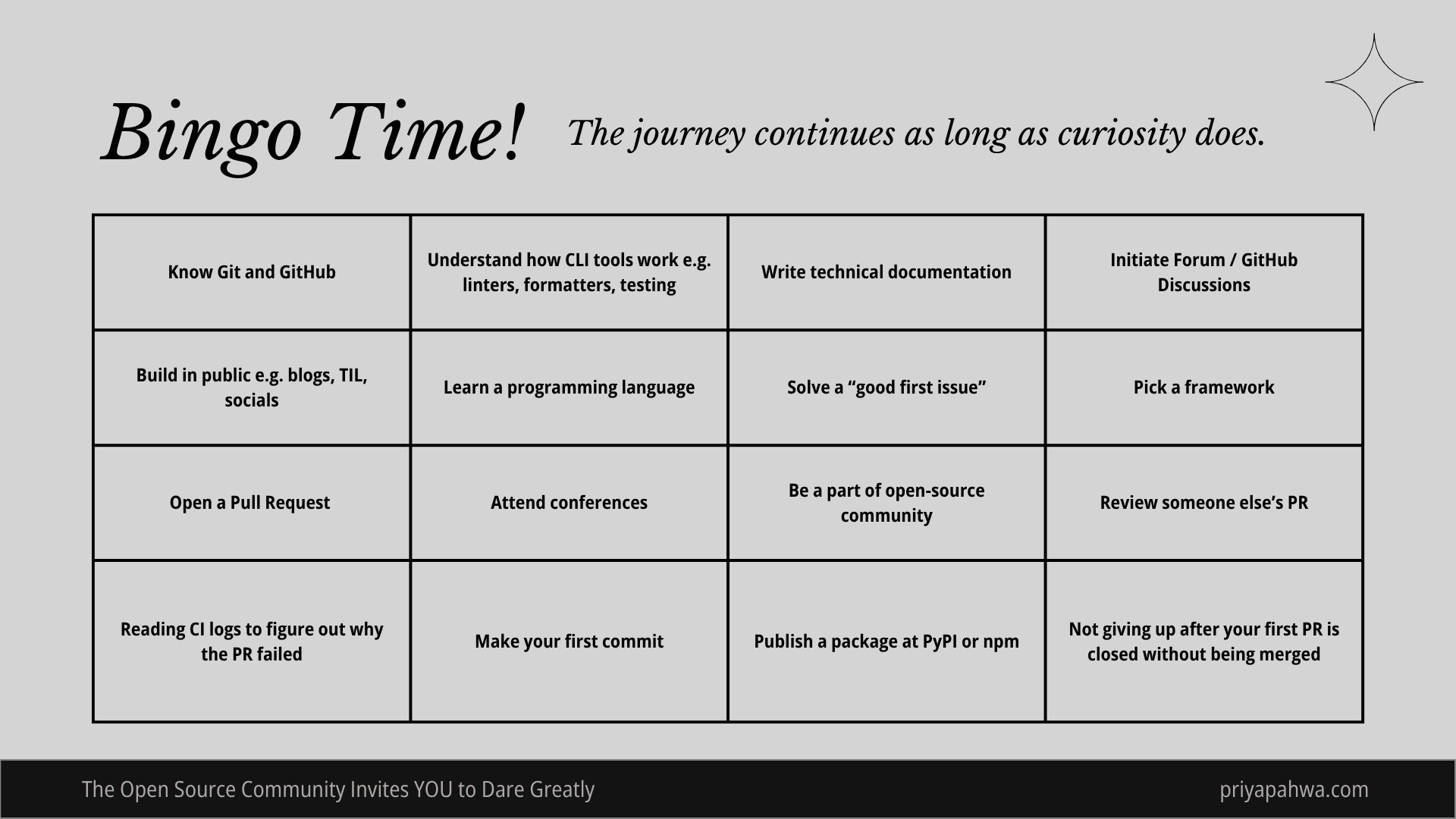[Software Freedom Day Talk] The Open Source Community Invites YOU To Dare Greatly
This post is designed for beginners who are new to open-source. It shares my journey of learning through courage, community, and competence. From making early contributions to understanding how healthy communities sustain growth, it’s less about perfect code and more about showing up, asking questions, and learning in public. Honestly, I’m still figuring things out and there is lot to do but that’s exactly what makes this space worth being part of.
Presented at Software Freedom Day 2025 by Priya Pahwa
Date: November 02, 2025
Location: Panjab University, Chandigarh
Presentation Mode: In-Person
Slides: Link
This talk was created for first-year university students with no prior experience in open source but an eagerness to begin their journey in coding and community.
Daring Greatly: How to Begin in Open Source Without Feeling Overwhelmed
When we say open source, most people think of just code. But open source is actually an ecosystem of opportunities — real and tangible ones. It can open doors to internships, jobs, and freelancing. It helps build your public brand and resume. It connects you with amazing people across projects and conferences. It gives you a chance to speak, collaborate, and belong in global communities.
So, this blog post isn’t about why you should contribute. It’s about how to actually begin in a way that feels human, doable, and sustainable.
 The Open Source Community Invites YOU To Dare Greatly
The Open Source Community Invites YOU To Dare Greatly
The Vulnerable Dare
No matter how beautiful the journey might look in your head, it’s always daunting to start. This is the vulnerable moment most people never say out loud. You open a project and some parts look familiar, but other parts feel like a different language. Your brain goes “freeze.” You assume everyone else understands it, and you don’t belong.
Let me say this plainly: that exact feeling is normal. It does not mean you don’t belong. It simply means you are ready to start.
Here’s the core idea: Dare Greatly. Not in the sense of grand bravery, but through small, visible acts. Make a tiny public move such as asking a question, opening a draft pull request, fixing a typo, or improving a line of documentation. That visible act invites help, feedback, and learning. This is how you begin to belong.
Two States of Getting Stuck
There are two classic blockers I call The Brain Freeze and The Perfect PR Trap.
🧊 The Brain Freeze
You stop, not because you cannot learn, but because you think confusion means you do not belong. The way out is not to keep figuring things out alone. It is to show up, ask one small thing, and keep repeating the process.
🌀 The Perfect PR Trap
You wait for the perfect pull request, the perfect setup, or the perfect understanding. That moment never really arrives and only encourages procrastination. Real contributors accept imperfect first attempts. The community expects imperfection. Reviews, edits, and iteration are normal. The only impossible standard is perfection.
The Triangle of Growth: Courage → Community → Competence
We often think we need competence first. But in open source, competence actually comes last.
Progress flows through a simple path: Courage → Community → Competence.
I call this the Triangle of Growth. You begin with the courage to ask a question. You then find support within a shared learning community. Through participation, you gradually build competence.
My Start: From College Societies to Open Source
Let me place myself quietly in this triangle. I was confused too (I still am), more times than I can count. So here’s an honest snapshot of how I started.
I didn’t enter open source through code. I entered through college societies. You know that phase where you join a random club because it looks fun, and suddenly you’re planning events, designing posters, and writing announcements at 1 AM?
Folks would message:
“Hey, we need a poster for tomorrow’s event.”
Tomorrow.
Actually, they mean in 20 minutes.
Or:
“Can you write the promotional caption?”
“What’s the event about?”
“We’ll figure it out later, just write something catchy.”
At some point, I started asking myself:
Why am I doing this? What is even in this for me?
But here’s the thing. I loved organizing. I loved creating spaces where people felt included. I loved watching a room go from empty → conversations → energy.
That love eventually led me to the GitHub Campus Experts Program. Not because of code or achievements, but because of the desire to build communities where people felt like they belonged.
What is the GitHub Campus Experts Program?
Campus Experts are student leaders who strive to build diverse and inclusive spaces to learn skills, share their experiences, and build projects together.
They can be found across the globe, leading in-person and online conferences, meetups, and hackathons, and maintaining open source projects.
What was the GitHub Octernships Program?
After the Campus Experts Program, I discovered the GitHub Octernships, a global program that connects students with global companies, startups, and partner organizations for short-term, paid internships. It aimed to combine the learning mindset of open collaboration with the structure of real industry projects. It’s a space where students get to:
- Work with global companies
- Receive mentorship from professionals
- Enhance job prospects through real-world experience
- Earn a competitive student stipend
As part of this program, I contributed to as a Software Engineer Intern, working with the Django tech stack at a startup. It gave me my first taste of building production-level features, collaborating through pull requests, and understanding how mentorship works in a real team setting.
👉 Learn more here (Not active anymore)
Finding the Right Organization
Choosing where to contribute matters as much as what you build.
- Match Interest, Not Reputation: Don’t chase the biggest names. Pick projects that align with what genuinely excites you, whether that’s web development, data, or automation. Passion sustains consistency.
- Check Activity & Mentorship Opportunity: Look at how active the community is. Are issues being responded to? Do maintainers guide newcomers? A supportive project teaches more than a famous but inactive one.
- Read the Project Culture, Not Just the Code: Go beyond repositories. Read discussions, contribution guidelines, and how reviews are handled. It reveals how teams communicate and collaborate.
- Start Small to Test the Fit: Begin with small contributions like fixing documentation or minor bugs. It helps you learn the workflow and understand if the project environment feels right for you.
Note to my future self: Don’t rush to belong everywhere. The right project often finds you when you’re learning sincerely.
Open Source Isn’t a Linear Roadmap
It’s more like a BINGO CARD!
You discover, try, fail, learn, and connect — all in your own sequence.
The journey continues as long as curiosity does.
Bingo Time! 🎯
From Exploration → To Belonging and Guidance
You’ve tried things. You’ve built some skills.
Now you’re ready to jump into a particular orbit.
For me, that next orbit was Djangonaut Space.
What is Djangonaut Space?
Djangonaut Space is an 8-week group mentoring program where individuals work at their own pace in a semi-structured learning environment.
Djangonauts are members of the community who wish to deepen their Django code contributions and grow into future community leaders.
What You Start Caring About Slowly Becomes Your Competence
Find your niche, whether that’s a working group, documentation effort, or a smaller aspect within the framework you contribute to.
Curiosity gives direction. Repetition builds strength. And caring consistently turns effort into expertise.
Theories from the Trenches
Key takeaways from engagement with open-source communities and learning from peers in public spaces:
- Velocity vs. Visibility Paradox
- Observation: Increasing visibility through great documentation, public mentorship, and sharing progress, often drives more sustained code velocity than than isolated ad-hoc workflows.
- Focus on the signal, not just the engine.
- The Strength of Weak Ties (The Bingo Card Effect)
- Theory: The most significant breakthroughs and surprising collaborations often emerge from “weak ties.”
- Embrace the randomness and unexpected connections.
- Vulnerability Enables Growth
- Core Belief: The path to ambitious growth requires being safe enough to fail in public.
- Community health is the bedrock of rapid learning and personal advancement.
Community Health: “How we treat each other is part of the infrastructure.”
Principles of Community Health:
- From Structure to Culture: Working groups and mentorship guidelines define structure, but community health is the culture that sustains every project.
- The Foundation: Community health ensures long-term sustainability, measured by human quality, not just code quality.
- Health Enables Courage: It creates psychological safety, encouraging contributors to Dare Greatly without fear of harsh judgment.
- A Core Objective: A healthy environment retains contributors and strengthens the ecosystem.
Daring greatly is not about being bold. It is about being willing to be seen while still learning. It is less about where you start and more about how you grow with others. Each question asked, PR opened, or idea shared moves the ecosystem — and YOU — forward and contribution begins just there.

